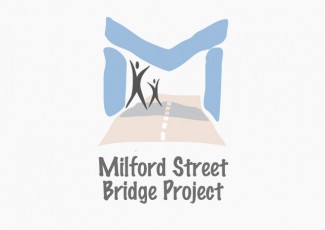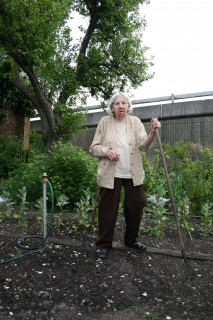Phyllis Maple : The Latter Years
Rita L. Jacob


After being discharged from the navy, Reginald Maple became a painter and decorator and, between 1946 and 1953, Phyllis gave birth to three daughters; the family now consisting of Bob, Pamela, Margaret and Maureen. As the house was wired only for lighting, washing and bathing were protracted chores; there also being no bathroom until Maureen’s was six:
‘We used to have what we called a bungalow bath, which was out in the kitchen an’ we used to dip the water out of the copper into the bath the little one first then put that one to bed then all the way down through the ages an’ then after that we used to set to an’ do the washing, my husband used to help me, and, we used to … boil all it back up all the water while it’s up in the copper’
Even when the property was modernised, Phyllis continued to wash clothes by hand; a spin drier being her only laundry appliance.
In many ways, her children’s childhood mirrored Phyllis’s own. They kept chicken and animals in the garden and helped their parents with the two allotments in London Road. They also attended St. Martin’s Infants but, by the time the girls were seven, junior children went to the new school that had been built in Shady Bower; this catering for both boys and girls. Phyllis used to prepare meals for when they came home at lunch time, Bob cycling across town because he liked his mother’s cooking so much.
Tragically, Phyllis was to lose two of her daughters at an early age; Pamela dying after a head injury when she was nine, and Margaret, following the birth of her first child in 1971. Also, in the late 1960s, Phyllis’s mother needed care; being unable to cope after the death of her husband, Herbert. When Ada was moved from the London Road Phyllis had to walk down to her room in Bedwin Street a number of times a day:
‘I used to go down there five or six times a day up n’ down from here to there, n’ make her a pudding an’ cook ‘er things when she wasn’t able to do things for herself and, clean up n’ shop or whatever she needed, an’ then, eventually I had her here when she was poorly … when it was too much too much up n’ downs there I had her here and I looked after her here till she died’
For seventeen months, Phyllis cared for Margaret’s daughter; returning to Woolworths to work when the child went to live with her father:
‘I went back, years ago when I was in my fifties after my daughter died, an’ they took the baby away from me I went back there to work for another five years, an’ I used to cut all the meat, for the, counter you used to sell [it] loose you know buy yer meat by the quarter pound or whatever an’ cheese I do that an’ make all the sandwiches for the sandwich bar from half past seven in the morning till half past five at night I was in my fifties then, but it really helped, after my daughter died to be busy’
This was a time of dramatic change in the area around Guilder Lane although, at first, residents did not really know what was going on:
‘They didn’t tell us that it was coming but then not like officially so that was when the Council took the houses over the whole row along ‘ere, up to here but then they’re privately owned along the other end, but it didn’t affect them so much’
Phyllis, however, did not lose her home when Churchill Way was built although a substantial amount of garden was taken and the Maples were no longer able to keep chicken:
‘They took ‘alf my garden and my lovely apple tree they tookan’ all my gooseberry bushes an’ I had twenty seven pound for that’
Thirty years on, Phyllis thought that the traffic was ten times worse than it was before; being particularly horrendous on Fridays and the weekends.
Several years after the road was completed, Phyllis’s husband was forced to retire early from work, having developed a heart problem. In order to prolong his life, Reginald took a doctor’s advice and gave up smoking, Phyllis remembering the day he stopped:
‘He was sitting in here one day with a nice fire an’ he’d rolled a cigarette an’ he found he was rolling another one so he took it all of it and threw it in the fire and he never smoked from that day an’ he said that he when he wasn’t brave he just was scared so he just gave it up’
Reginald lived another twenty years and during that time they were able to devote more time to their shared hobby:
‘Then we had a hobby … our hobby … especially … after he’d had been poorly and had to … ease up on his work … we used to make home made wine from the produce from the garden left over things all the vegetables ‘n things we did there was nothing wasted’
They also enjoyed games of darts although Percy found exercise increasingly difficult; also developing gall stones and ulcers towards the end of his life.
‘of an evening we used to ‘ave a game of darts fer about an hour that’s as much as ‘e could manage an’ then we’d sit down an’ ‘ave a glass of wine an’ play cribbage that was our fun and game … but were happy’
Reginald died in 1994, three years after he and Phyllis had celebrated their Golden Wedding Anniversary.
Despite the tragedies in her life time, Phyllis considered that she had been lucky to have had a good family and a very happy marriage. She was immensely proud of her two surviving children and their achievements, both going to Buckingham Palace on different occasions to collect Duke of Edingburgh Awards. Also, Bob had a successful career in the Royal Air Force while Maureen became a school teacher, thus fulfilling Phyllis’s own ambition. Therefore, it is fitting to use Phyllis’s own words to conclude this synopsis of her many memories:
‘We were always poor we never had any riches n’ never craved riches if you know what I mean, because you just made the best of what you had’
Postscript
Phyllis died on 27 April 2014 at the grand age of 94. She will be sadly missed by all those who were involved in the retelling of her life story.







No Comments
Add a comment about this page